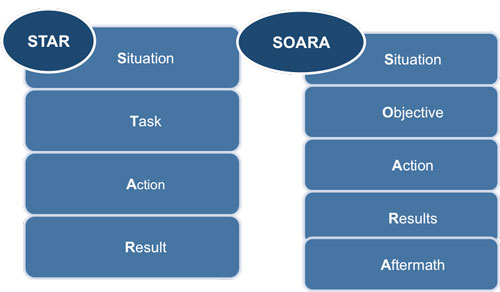Competency-Based Questions
You will be able to recognize competency-based questions by the way they are phrased. For example:
'Tell me about a time when…'
'Describe a situation where you had to …'
'Give me an example of how you …'
For example, a candidate may be asked the following question: 'Tell us about an occasion where you have shown leadership'.
Their response to this primary question will determine which secondary questions they are asked. These secondary questions usually ask for more detail in the area that the interviewer finds the most 'interesting.' For example:
Interviewer: Tell us about an occasion where you have shown leadership.
Candidate: I was captain of the university basketball team and my responsibilities included organizing the weekly training sessions. This was actually the toughest part of being team captain: once the game actually started everyone was sufficiently self-motivated to give their best performance, but persuading people to turn out to the weekly training sessions, so that we could win, was the most difficult part.
Interviewer: Go on...
Candidate: I found that the best way to motivate players to train was to agree with the coach which particular skill each individual player needed to work on most - we would discuss this after each game. I'd then approach the players individually and 'sell' the training session based on that. I found that when players believed that the training session was going to address their own needs, rather than being just general training, they were much more motivated to show up.
Interviewer: Interesting. can you give me an example of how you would 'sell' a training session? What type of thing would you say to a player?
As you can see from the example, the interviewer has used a subsequent question to elicit more information about a particular aspect of the 'leadership' competency that was demonstrated in the first answer.
This illustrates the fact that answers to these type of questions need to be based on real experiences because it is impossible to 'make up' convincing answers on the spot. When people are talking about things that have actually happened and things they have done, their delivery tends to be relaxed with few hesitations. An experienced interviewer can tell when a candidate is lying or exaggerating because their body language will reflect this and there will be unnatural pauses in their answers while they think about what to say next.
The diagram shows three approaches you can adopt when answering competency-based interview questions.
 |
1) Answer Spontaneously
This is a risky strategy and is not suited to competency-based interviews (CBI's). In CBI's each question is targeted to assess a particular competency. In your reply you need to give a specific example that illustrates this competency. Under pressure and without prior planning most people just use the first example they can think of, which as they continue with their explanation they realize it is not the best or most appropriate one. By the time they recognize this they are too committed to change and this has two effects:
1) It undermines their own self-confidence.
2) It results in a low score for that competency.
2) Use Model Answers
This sounds tempting and there are plenty of publications offering you 'Brilliant Answers to 1001 Interview Questions' or something along those lines. The problem with this approach is that it simply does not work for competency-based questions, which rely on you providing specific examples that are supported by your personal history. Remember, everything you say must be supported by your resume or portfolio, which is obviously not going to be the case with a model answer.
3) Use the STAR or SOARA method
These techniques have been designed to help you identify the most convincing and evidenced example you have to demonstrate a specific competency. Using either of these methods, your answers will be meaningful, evidenced-based, and unique, allowing you to communicate your capabilities clearly and easily to any interviewer.
 |
These methods are independent of each other and which one you use is a matter of personal choice. The STAR method is the simpler of the two and is recommended for recent graduates or people who don't have a lot of management experience.
Both of these methods require significant time and effort to implement but the good news is that you don't need to repeat all of the stages before each interview. When you have done it once you only need to spend a limited amount of time to keep the information up to date in preparation for each subsequent interview.
The following sections provide a worked example of how each method is used. The first uses the STAR method to show how Ricardo, a recent university graduate with no management experience, can plan his answers to competency-based questions by drawing on his university, sporting, and part-time job experiences - STAR Example.
The SOARA method is illustrated using the example of Helena, a project consultant with twelve years' experience, who has far more relevant work experience to draw on - SOARA Example.
You may also be interested in:
Competency Based Interviews | Competency-Based Questions | STAR Method | SOARA Method.


